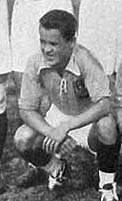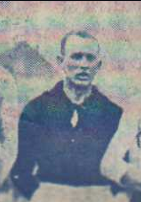Related Research Articles
The 1929 National Championship was won by Hajduk Split.
The 1939–40 Yugoslav Football Championship was the 17th, and last, season of Kingdom of Yugoslavia's premier football competition. The season lasted from May 2 to June 19, 1940.

Fudbalski klub Čukarički is a Serbian professional football club from Belgrade, more precisely from the Čukarica municipality, that currently plays in the Serbian SuperLiga, the top tier of Serbian football.
Milan Rajlić was a Yugoslav professional footballer and football manager.

Aleksandar "Tirke" Tirnanić was a Serbian football player and manager.

Sportski klub Jugoslavija, commonly known as Jugoslavija, was a Serbian football club based in Belgrade. It was originally formed as SK Velika Srbija in 1913 and changed its name to SK Jugoslavija in 1919. They were among the most popular Serbian and Yugoslav clubs, and they were nicknamed as "Crveni" because of their red shirts, in opposition to their greatest rivals BSK, who wore blue and were known as "Plavi". Until 1941 the sports society Jugoslavija, beside football, also included sections for athletics, cycling, winter sports, basketball, boxing, wrestling, swimming, and table tennis.
Vilmos Sipos, also known as Vilim Šipoš and Willy Sipos was a Hungarian football player and manager. He played for several important clubs in a number of countries, having represented at national level both Yugoslavia and Hungary.
Dušan Petković was a Serbian and Yugoslav football forward.
Branislav "Bane" Sekulić was a Serbian football player and football manager.
Aleksandar Petrović was a Serbian football player and manager.
Severin Bijelić was a Serbian actor. He appeared in 77 films and television shows between 1949 and 1972. He starred in the 1967 film The Rats Woke Up, which won the Silver Bear for Best Director at the 17th Berlin International Film Festival.
Prvoslav Dragićević was a Serbian football manager and player.
SK Jedinstvo Beograd was a Serbian football club based in Belgrade, Kingdom of Yugoslavia.
Serbian League was a football league championship played between the late 1930s until 1944 in Yugoslavia. With the creation in April 1941 of the Serbian military administration, which was a quisling civil government set up by German authorities, the league became the highest level domestic football competition within the territory.
The Belgrade Football Subassociation, commonly known by its initials, BLP was one of the regional football governing bodies under the tutorial of the Football Association of Yugoslavia. It was formed on 12 March 1920, and included the clubs from the geographical territories of Vojvodina, Central Serbia, Old Serbia (Kosovo) and South Serbia (Macedonia). The increase of number of clubs made that progressively other subassociations become formed by separating them from Belgrade's one. By 1932 its territory included beside Belgrade metropolitan area only the districts of Kolubara, Braničevo, Podunavlje and Jasenica-Kosmaj.
The Skoplje Football association was one of the regional football governing bodies under the tutorial of the Football Association of Yugoslavia. It was formed on 18 December 1926 having been earlier part of the Belgrade Football Subassociation. By the time of its formation it included the clubs from the districts of Skopje, Bregalnica, Bitola, Kosovo and Vranje. It was one of the Football Subassociations which formed the football league system in the Kingdom of Yugoslavia.

Károly Nemes was a Hungarian football goalkeeper and coach. He is best known for his work on champion teams of SK Rapid Wien and SK Jugoslavija. He coached throughout Central and South-Eastern Europe.
Nikola Perlić was a Yugoslavian footballer who played in top league clubs in Yugoslavia and France, and played for the Yugoslavia national team.
Rodolfo Tommasi was an Italian footballer.
Đorđe Detlinger was a Serbian footballer.
References
- ↑ Note: counting stats only at national level from the Yugoslav championship final stages, excluding the stats from the Belgrade Subassociation league which the club played all seasons.
- ↑ Statistics at Golgolgol.net Archived 2013-01-11 at archive.today
- ↑ Luiigi Di Franco at exyufudbal.in.rs
- ↑ Milorad Sijić: "Football in Kingdom of Yugoslavia", pag. 169, Di Franco is listed at Jedinstvo squads of 1939 and 1940
- ↑ Sportista, n1024, Belgrade 20 January 1937, page 2
- ↑ 1940-41 Yugoslav Championship season at fkvojvodina.com (open squad details)
- ↑ BSK - Jugoslavija Sećanja Na Prvi Beogradski Večiti Derbi by Živko M. Bojanić at GoogleBooks
- ↑ Career at enciclopediadelcalcio.it
- ↑ Career at enciclopediadelcalcio.it
- ↑ Franco García, Wilfrido (13 April 2012). "El Viejo ´Contingente´ en Colombia" [The old ´Contingent´ in Colombia] (in Spanish). El Deportivo. Archived from the original on 6 December 2012.
- ↑ "Luigi Di Franco". World Football. Retrieved 5 February 2023.